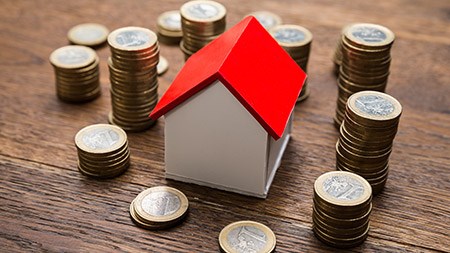Wondering what the property market will be doing this year? We asked some of the country’s leading experts for their views.
All in all, 2017 was a bad year for South Africa. As if credit rating downgrades, a lack of economic growth, growing reports of state capture, and soaring fuel and food prices weren’t enough, we also had to contend with a president who seemingly reshuffled his cabinet on a whim, removing respected ministers and replacing them with people with little or no experience in the key positions to which they had been appointed. The rand was severely affected by all this and as investor confidence dipped, so did the value of our currency.
The news that Cyril Ramaphosa had been elected president of the ANC was well received by the markets and the rand strengthened almost immediately. We are not out of the woods just yet, although rating agency Moody’s noted that Ramaphosa’s election opened up a tentative possibility of a ‘credit positive’ shift in SA policy and an increase in business confidence. Fitch on the other hand stated that although the full repercussions of Ramaphosa’s victory will be far-reaching, they are likely to remain unpredictable ahead of the 2019 elections.
With all this in mind, we asked some of South Africa’s top property executives what they believed 2018 would hold for South African property:
Simon Bray, Private Property CEO
"2017 was a tough year for the property market in general. Although there were pockets of excellence the market was subdued with low average house price growth.
"Indications so far are that 2018 may be a better one for the market. With the ANC elective conference over and a business savvy and investor friendly president at its helm, the hope is that we will see more stability with regards to policy and personnel. We have already seen an improvement in the value of the currency and in business confidence and if this continues we should see an improvement in the property market as pent up demand is released. Data from our website at this stage of the year already shows a large increase in traffic when compared to the same period last year.
"Much will however rest on what transpires politically in the next few weeks as two different camps within the ANC jostle for power. We should have a much better idea of what the year holds after the State of the Nation address and Budget Speech are concluded."
Andrew Golding, CEO Pam Golding Properties
“It was widely anticipated that the ANC elective conference held in December 2017 would provide clarity on the likely political and economic outlook for South Africa in 2018.
“While the election of Cyril Ramaphosa as the president of the ANC suggests that it is highly likely that the new year will be characterised by a more stable political environment and hence a stronger economy - and more robust housing market - the fact that Ramaphosa will be preoccupied by the need for unity within the party suggests that any break with the past few years will not be as decisive as initially hoped.
“The economic prospects for the new year will become clearer in the weeks ahead – as policy direction is revealed in the State of the Nation address and the 2018/19 budget speech.
“The international ratings agencies – as well as the financial markets – will be closely monitoring the political and economic signals from these speeches.
“Global financial markets have responded positively to Ramaphosa’s election, with the rand in particular rallying strongly, thereby reducing pressure on the Reserve Bank to raise interest rates. If the new ANC president is able to deliver on the market’s perceptions of a shift in SA’s political and hence economic fortunes, there is likely to be considerable pent-up demand for property – as both business and consumer confidence is likely to rebound strongly from current subdued levels."
*Myles Wakefield, CEO Wakefields *
“Given the current local and global landscapes, I really believe 2018 will be the best year of the last four or five. Yes, there’s always the small print disclaimer to that, but looking at where we were a year ago, and where we are today, I feel bullish about 2018 in general and our property market in particular. My sentiment is predicated on the back of a new ANC leader who has the business acumen to which local and global markets respond favourably - the reaction is already clearly visible - and who, although faced with a massive task, appears to have the strength, skill and determination to begin resolving our social and economic challenges.
“But rising confidence doesn’t just stem from our local scenario. We’ve been lagging behind the strong world economy, and if we can call a halt to our long run of ‘own goals’, we can take advantage of this lucky global hand we’ve been dealt.
“The condition of the rand is always an important indicator of the state of the nation. When it’s strong, it’s a big positive for property. Today, the rand reflects the confidence being felt locally and globally that the new ANC leader will begin repairing the damage.
“When it comes to buoyancy in the property market, confidence is a major driver. The drop in the petrol price bodes well, and there’s encouraging talk about an interest rate cut…all clear confidence boosters. If the banks ease up on their stringent lending conditions this year, this will further stimulate the lower end of the market, and if stock levels subside at the higher end, we’ll see growth.
“One disclaimer has to include time frames, and although change can’t and won’t happen overnight, when it comes to the ratings agencies and our credit status, we don’t have the luxury of time. The new ANC president has to deliver what’s required, fast and effectively, to allay fears and stave off what would be a major set-back to progress.
“I’m a firm believer that 2018 is our turning point, for the country, for KwaZulu-Natal, and of course, for our property market.”
Samuel Seeff, Chairman Seeff Property Group
“The property market has shifted notably over the last 18 months as the fall-out from the weak political and economic climate, poor growth and credit downgrades continue. The inevitable result is that this rather good performing economic sector is now also taking strain.
“Whereas it was a sellers’ market until early 2016, we saw a progressive shift in 2017 which manifested in lower demand, rising stock levels combined with a decline in buyer confidence, flat price growth and deals taking longer to conclude. The outcome is that we head into 2018 with a buyer’s market for most areas, even some Cape locations.
“Of concern is that there is still a lag on the sellers’ side of the equation with price expectations out of step with the market. The result is an overall weaker market with low levels of liquidity that now favours buyers in most areas.
“Overall, the market is down by about 15%-20% from the 2015-highs. Yet we operated in 2017 with slightly improved fundamentals compared to 2016, being a lower repo rate (6.75 percent vs 7 percent in 2016) and slower inflation (5.3 percent vs 6.5 percent in 2016).
“Even the stand-out Cape is beginning to slow down although it continues to benefit from a broad base of demand such as the constant flow of semigrating buyers from other areas, investment and holiday demand.
“The reported slow-down in semigration is also attributable to the slow rate of sales in other provinces combined with the high prices in the Cape which has now also put a dampener on this market.
“The mid-market below R2 million remains the most active, but very susceptible to financial strain. The upper end, despite being able to better absorb economic fluctuations, has seen a notable slow-down in the Gauteng market above R5 million and in the Cape above R8m and above R18m on the Atlantic Seaboard. The holiday and investment market has also slowed as an inevitable fall-out from the weak confidence levels."
Adrian Goslett, CEO RE/MAX of Southern Africa:
“Over the last year, residential property sales have gone from strength to strength in Cape Town and the surrounding areas, a trend that is expected to continue in 2018.
“The Mother City remained highly sought-after throughout 2017, which is evidenced by the significant increase in property sales we have seen in the last twelve months. There has been a continued influx of people moving to the Western Cape from many of the inland regions throughout the country. The demand has resulted in property price growth in the Western Cape outstripping other regions of the country – good news for homeowners, but bad news for first-time buyers trying to get their foot in the door.
“Fuelled by real demand, we predict that Cape Town will continue to see positive house price growth in 2018. While the very steep upward curve we are currently seeing may flatten marginally, Cape Town will remain a lucrative investment destination from both a capital growth and rental income perspective as the current growth is not a bubble.
“While property sales in Cape Town increased, Johannesburg experienced a slowdown this year. Although sales were up marginally in 2017 on the previous year, there was a decline in registrations due to issues such as the lack of available bank finance and lags at the deeds office.
“Looking ahead to 2018, the recent downgrade by another of the major credit rating agencies could see the Johannesburg market slow further, with finance likely to become more expensive. It will cost more for the government to borrow money, which in turn will have a knock-on effect on the consumer. Financial institutions will need to hold more money in reserve, which will make it more difficult to obtain credit, and the credit that is granted will come at a higher cost. A marginal mitigating factor is that to some degree financial institutions have already made provision and priced in the effects that a downgrade would have on credit costs.
“There have been some positive shoots since the election of Cyril Ramaphosa as ANC head but the true test will come in a power shift and passing on of the baton from the current President. There seems to be a slightly more positive sentiment in those proverbial “whispers in the corridors” but I believe that local and foreign investors want to see some real action before they begin to climb back in fully to the property market. Having said that, there is still a fair deal of movement in the market with RE/MAX having concluded over R2.8 billion rand worth of property sales in the month of December – its best month ever by almost R300 million rand.”
Richard Gray, Harcourts Africa CEO
Many of us closed off the year anxiously monitoring the ruling party's executive committee election. For the large part, it's important for us to show an active interest in the direction our country is moving in, in the other sense we desire a Government that is transparent and has the best interests of its people at heart. The economy certainly experienced quite a number of dramatic shifts during 2017 and some markets were effected, be it positively or negatively. Harcourts for one experienced defiant growth, showing that many South Africans remain active in an uncertain economy.
A point to take note of are the knock-on effects of the political climate in South Africa. Often the negative reactions to short term economic changes are only felt the following year. On this point, I am very hopeful that there will be more stability in the political messaging from Government, as well as less major ministerial suprises, however this is difficult to predict.
Consumers might be in a price pinch for a little while longer, but the market already seems to be gaining momentum. Property outweighs a lot of the immediate reactions due to its long-term nature, however the commercial and rental markets might react more sharply to any more surprises.




